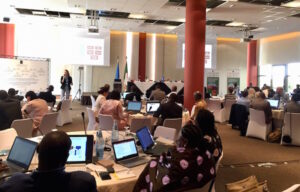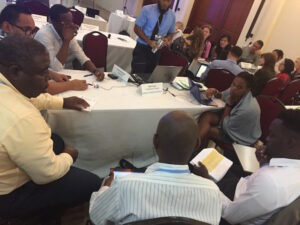In coordination with the United Nations Framework Convention on Climate Change (UNFCCC)’s Consultative Group of Experts (CGE), the Greenhouse Gas Management Institute recently concluded the delivery of three regional workshops on institutionalizing data management for producing national greenhouse gas inventories. Earlier this month, the 3rd of these workshops in Siem Reap, Cambodia capped the 2019 series that provided training to experts from the global regions of Africa, the Caribbean, Latin America, Eastern Europe, Asia and the Pacific Ocean.
The three regional CGE workshops, in Belize, Algeria, and Cambodia, were held to address challenges reported by low and middle-income countries in their national communications and biennial update reports to the UNFCCC. Specifically, countries in each region indicated data management issues when compiling GHG emissions inventories and subsequent reporting protocols in the context of the Paris Agreement. These reported impediments included lack of primary GHG data, issues with the format of available data being collected, lack of human resource capacity, insufficient technical infrastructure to support data collection and management, as well as lack of quality control and quality assurance (QA/QC) protocols to ensure reliable data documentation.
 The workshop curriculum responded to these data-related issues by providing training to build the technical capacity of experts within these countries. UNFCCC and GHGMI faculty and staff led programs that introduced participants to professional good practices in data management; including system design, governance, data quality, information archiving, and stakeholder engagement. Participants dove deeper into these topics through interactive technical sessions focused on: approaches to institutional arrangements and data management, the functions of a national MRV data management system, IPCC good practice guidance for QA/QC, data documentation, methods to resolve data gaps, and opportunities for synergy.
The workshop curriculum responded to these data-related issues by providing training to build the technical capacity of experts within these countries. UNFCCC and GHGMI faculty and staff led programs that introduced participants to professional good practices in data management; including system design, governance, data quality, information archiving, and stakeholder engagement. Participants dove deeper into these topics through interactive technical sessions focused on: approaches to institutional arrangements and data management, the functions of a national MRV data management system, IPCC good practice guidance for QA/QC, data documentation, methods to resolve data gaps, and opportunities for synergy.
 The workshops were well attended, and the discussions prompted participants to share their experiences and lessons learned, allowing attendees to walk away with achievable steps and expanded networks to better institutionalize data management within their national contexts.
The workshops were well attended, and the discussions prompted participants to share their experiences and lessons learned, allowing attendees to walk away with achievable steps and expanded networks to better institutionalize data management within their national contexts.

Comments